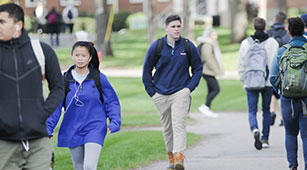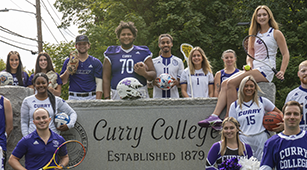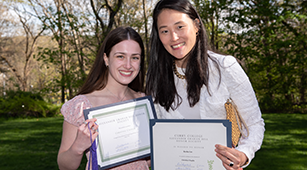Schedule an appointment to meet with Career & Experiential Learning about your area of interest.
Make an AppointmentPAL Contact for Parents
- 617-333-2035
- jpeters@curry.edu
- Webb Learning Center
Parent Orientation Guide
Welcome to PAL!
Over the years we have had the pleasure of working with thousands of bright, talented students with diagnosed learning differences, AD/HD, and executive function weakness who have come to recognize their academic potential. Although many students come to us with histories of academic difficulty, we are continually amazed by the brilliance that they can demonstrate. We look for it.
PAL's approach to academic support is distinguished by its team of credentialed professors. These faculty members are adept at adapting to the unique needs of each individual, employing a range of techniques and skills to facilitate effective learning experiences. Moreover, PAL's courses are credit-bearing and meet the rigorous standards of accreditation, ensuring academic credibility. Emphasizing creativity and flexibility, PAL's course design and delivery foster engaging learning experiences through hands-on activities, real-world analysis, information literacy, and simulations. This innovative teaching methodology is further complemented by a highly personalized approach, with customized curricula tailored to meet the specific needs and diverse learning styles of each student. PAL's faculty and staff bring a diversity of skills and personalities to the table, allowing them to cater to the varied profiles and needs of students with unparalleled effectiveness.
*Key Research Foundations:
Transformation & Adult Learning; Metacognition, Reflective Practice; Mentoring; Emotions & Learning; Educational Therapy; Compensatory Strategies; Attention & Self-Regulation & Executive Functioning
Students make a commitment to attend PAL regularly and report truthfully about their performance in classes. Attendance is critical. They are asked to engage in meaningful reflection on their learning and be willing to explore new habits or mindsets.
Parents can support independence by allowing their children to advocate for themselves. This is sometimes a difficult transition for parents who have been strong successful advocates. Parents can help by encouraging the use of PAL for assistance and guidance. If there is difficulty communicating with a PAL professor, parents should encourage the student to contact the PAL Student and Parent Coordinator.
PAL professors operate from a strength-based focus, guiding students to choose strategies based on their unique learning style. Together, they assess challenges and strategies. Other learning conversations might address issues of motivation, keeping them engaged in learning, and career interest. PAL professors help to develop self-advocacy and other individualized goals set collaboratively. Course material serves as the springboard for PAL work.
Q: What is the nature of the support offered by PAL?
A: Students meet regularly (2 or 3 times per week) with a PAL professor in a combination of individual and/or small group sessions and are helped to understand their learning styles, strengths, difficulties, habits, and mindset. Based on that understanding, strategies are chosen and reviewed for effectiveness. Student self-understanding and empowerment are at the core of the highly personalized process. Practical instruction using coursework is meaningful and builds confidence.
Q: Will PAL professors regularly contact classroom professors to monitor progress?
A: Generally, no. We rely heavily on student reporting of their needs so that they are in control. Accurate reporting about attendance in class and other matters is critical. If there is reason to suspect that a student’s report is untrue, we may seek additional information; however, it is the student’s responsibility to report truthfully about their grades, attendance, and performance. We include students in conversations about them. Our goal is to develop students’ ownership of learning.
Q: What kind of feedback do students get about their performance in classes?
A: In addition to grades on homework, papers, and exams, as well as electronic Academic Alerts sent from faculty, students will receive feedback on each class through Canvas and their Midterm Grade Report. Students receive an “S” for satisfactory, a “U” for unsatisfactory” or “F” for failing, all of which will guide their work for the second half of the term.
Q: My son/daughter doesn’t always detect academic trouble. How will PAL help if students say that everything is fine?
A: By requiring that students attend PAL on a regular basis, students are faced with “reality checks” and asked to address issues that they may otherwise avoid. Discussions about coursework are designed to uncover realistic reflection on their progress. This might be a priority goal for a semester if it has been a problem in the past.
Q: Will parents receive regular communication from PAL professors?
A: It is central to our philosophy that we empower students as they develop responsibility. In college, students will serve as point people for all conversations about them. We limit conversation “about” them and encourage it “with” them. You may initiate contact with the PAL professor, but please note that, depending on circumstances, a return contact may be made once the student is present. According to federal law, written permission to speak to parents is needed for any conversations relating to student performance. General conversations about PAL and our expectations are welcome! At the end of the first three weeks of the semester, parents of students who are not attending regularly receive an email from the program indicating this and expressing concern. Students must sign the PAL Consent for Release of Information form before parents can receive this information. Contact the PAL office for information about this form.
Q: What should I do if my son/daughter expresses unhappiness with PAL?
A: Please have them speak to the PAL professor about any dissatisfaction. The program is based on student input, so we encourage feedback. If additional assistance is needed, the PAL Student and Parent Coordinator can often help.
Q: Can a student fail PAL?
A: Yes. Attendance is essential to success, is not optional, and constitutes a significant part of a PAL final grade. Student participation and cooperation are also important elements of PAL grading.
Q: Why might a student struggle academically even with PAL support?
A: There are several reasons why this might occur. The most common is poor attendance. Another is misrepresenting performance and attendance in other classes. We rely heavily on student report and expect truthful responses. A third reason is psychological, substance abuse, or personal issues that are not being addressed by appropriate professionals outside of PAL. Another reason is the desire to be independent and choosing to withhold information or commitment.
Q: Is course tutorial provided?
A: Instruction is embedded in coursework materials brought to PAL. Classwork challenges initiate discussions about strategies and related issues. PAL goes beyond the classic tutoring that is offered via Curry’s academic tutoring services and most typical college support programs.
Q: How often do students meet with PAL professors?
A: PAL meetings usually occur twice or three times per week in combinations of one-to-one, group, or pairs depending on individual needs and arrangements.
Q: Which PAL courses offer credit? Are they graded?
A: PAL 1190 and PAL 1200 are the 1.5 credit courses that all first year students in PAL are required to take. Grades of “P” and “F” are earned and can impact the grade point average. Courses beyond the first year are non-credit, earn, a “P” or “F” grade, but do not impact the GPA. Full-time or part-time PAL are options that can be repeated beyond the first year. Both Summer PAL (PAL 1180 for entering students) and Connections for Learning (PAL 1195) are offered outside of the regular academic year; students earn letter grades and 3 credits. PAL 2000 is Peer Mentoring and Coaching; students earn letter grades and 3 credits.
Q: What helpful questions might I ask my son or daughter?
A: Here are some suggestions:
- Have you missed classes? Are you attending PAL regularly?
Attendance is critical to success at Curry. - What did you get for midterm grades?
This allows some independence but provides a reality check for the rest of the term.
Q: What should I know that PAL professors don’t do?
A: We don’t write or rewrite papers, do research for students, provide answers to take-home exams, give extensive content tutoring, directly monitor classroom attendance or performance, make wake-up calls, send reminders about homework, supervise medication, or act in loco parentis. Fostering student growth and an internal locus of control in these are core to our philosophy.
Adelizzi, J. & Goss, D. (Eds.) (1995). A closer look: Perspectives on college students with learning disabilities. Milton, MA: Curry College.
Adelizzi, J. & Goss, D. (2001). Parenting children with learning disabilities. Westport, CT: Greenwood.
Adelizzi, J. (2002). Posttraumatic stress in women with ADHD. In P. Quinn & K. Nadeau (Eds.), Gender issues and ADHD: Research, diagnosis and treatment (pp. 365-393). Silver Spring: Advantage Books.
Amen, L.J. & Johnson, S.R. (with Amen, D.G.) (1996). A teenager's guide to A.D.D.: Understanding and treating attention disorders through the teenager years. Fairfield, CA: MindWorks Press.
Armstrong, T. (2010). Neurodiversity: Discovering the extraordinary gifts of autism, ADHD, dyslexia, and other brain differences. Boston: DeCapo Press.
*Arnett, J. J. (2004). Emerging Adulthood: The Winding Road from the Late Teens through the Twenties. New York: Oxford University Press.
*Barkin, C. (1999). When your kid goes to college: A parents' survival guide. NY: Avon Books.
Barkley, R. (2010). Attention deficit hyperactivity disorder in adults: The latest assessment and treatment strategies. Boston: Jones and Bartlett.
*Bips, L.L. (with Wallitsch, J. & Wallitsch, K.) (2003). Parenting college freshmen. Bloomington, IN: 1st Books Library.
Braaten, E. & Willoughby, B. (2014). Bright kids who can't keep up. New York: The Guilford Press.
Brinkerhoff, L.D., Shaw, S.F., & McGuire, J.M. (1993). Promoting postsecondary education for students with learning disabilities: A handbook for practitioners. Austin, TX: Pro-ed.
Brown, P., Roediger, H., & McDaniel, M. (2014). Make it stick: The science of successful learning. Cambridge, MA: Harvard University Press.
Brown, T. (2005). Attention deficit disorder: The unfocused mind in children and adults. New Haven: Yale University Press.
*Coburn, K. L., & Treeger, M. L. (2003). Letting Go: A Parents' Guide to Understanding the College Years (4th ed.). New York: Quill Harper Collins. (Original work published 1997)
Cummings, R., Fisher, G., Espeland, P., & Hanson, L.K. (1993). A survival guide for teenagers with LD. Minneapolis: Free Spirit Publishing.
Eggen, P. & Kaucheck, D. (2010). Learners with exceptionalities. In P. Eggen & D. Kaucheck, Educational psychology: Windows on classrooms (pp. 124-160). Upper Saddle River, NJ: Pearson.
Ficksman, M. & Adelizzi, J. (Eds.) (2010). The clinical practice of educational therapy: A teaching model. London: Routledge.
Fox, L. & Ijiri, L. (Eds.) (2010). Changing lives through metacognitive relationships: LD/ADHD and college success. Milton, MA: Curry College. www.curry.edu/PALpublications
Fox, L. (2013). Success factors 40 years later: The pioneer postsecondary program for students with learning disabilities, attention deficit hyperactivity disorder, and executive function. Learning Disabilities: A Multidisciplinary Journal, 18(3), 18-28.
Fox, L. (2013). Neurodiversity: Discovering the extraordinary gifts of autism, ADHD, dyslexia, and other brain differences. Book review in The Educational Therapist, 34(1), 31.
Fox, L. & Ijiri, L. (2015). Learning disabilities reference. Milton, MA: Curry College. curry.edu/PALpublications
Goss, D. (2008). To tell or not to tell: The workplace disclosure dilemma for college-educated adults with learning disabilities. The Educational Therapist, 29(2), 16-21.
Gregg, N. (2009). Adolescents and adults with learning disabilities and ADHD: Assessment and accommodation. New York: Guilford Press.
Ijiri, L. & Fox, L. (2005). Learning disabilities reference. Milton, MA: Curry College. www.curry.edu/PALpublications
Mapou, R. (2009). Adult learning disabilities and ADHD: Research-informed assessment. Oxford: Oxford University Press.
Mytkowicz, P. & Abrahams, L. (2018). Multilingual college students with learning disabilities/differences. In Ficksman, M. & Adelizzi, J.U. (Eds.), The Clinical Practice of Educational Therapy (2nd ed.): Learning and Functioning with Diversity. New York: Routledge.
Mytkowicz, P., & Goss, D. (2012). Students' perceptions of a postsecondary LD/ADHD support program. Journal of Postsecondary Education and Disability, 25(4), 345-361.
Mytkowicz, P., Goss, D. & Steinberg, B. (2014) "Assessing Metacognition as a Learning Outcome in a Postsecondary Strategic Learning Course" Journal of Postsecondary Education and Disability. 7(1)
Nadeau, K. (2006). Survival guide for college students with ADHD or LD (2nd ed.). Washington: Magination Press.
Nilson, L. (2013). Creating self-regulated learners: Strategies to strengthen students' self-awareness and learning skills. Sterling, VA: Stylus Publishing, LLC.
Novotni, M. (with Peterson, R.) (2007). What does everybody else know that I don't? Plantation, FL: Specialty Press.
Ostroff, W. (2012). Understanding how young children learn: Bringing the science of child development to the classroom. Alexandria, VA: ASDC.
*Pasick, P. (1998). Almost grown: Launching your child from high school to college. NY: W.W. Norton & Co.
Pink, D. (2006). A whole new mind: Why right-brainers will rule the future. New York: Riverhead.
Quinn, P.O. (Ed.) (2001). ADD and the college student: A guide for high school and college students with attention deficit disorder. Washington, D.C.: Magination Press.
Reiff, H.B. (2007). Self-advocacy skills for students with learning disabilities: Making it happen in college and beyond. Port Chester, NY: Dude Publishing.
*Roffman, A. (2007). Guiding teens with learning disabilities: Navigating the transition from high school to adulthood. NY: Princeton Review.
*Savage, M. (2003). You're on your own (but I'm here if you need me): Mentoring your child during the college years. NY: Fireside.
Siegel, D. & Bryson, T.P. (2012). The whole brain child: 12 revolutionary strategies to nurture your child's developing mind. New York: Bantam Books.
Silver, L. (2004). Attention deficit/hyperactivity disorder: A clinical guide to diagnosis and treatment for health and mental health professionals (3rd ed.). Washington, DC: American Psychiatric Publishing.
Smith, D. (2012). Monkey mind: A memoir of anxiety. New York: Simon & Schuster.
Sprenger, M. (1999). Learning & memory: The brain in action. Alexandria, VA: Association for Supervision and Curriculum Development.
Tough, P. (2012). How children succeed: Grit, curiosity, and the hidden power of character. Boston: Houghton Mifflin.
Willcutt, E. & Gaffney-Brown, R. (2004). Etiology of dyslexia, ADHD, and related difficulties: Using genetic methods to understand comorbidity. Perspectives, 12-15.
Wilson, R. and Lyons, L. (2013). Anxious kids anxious parents: 7 ways to stop the worry cycle and raise courageous and independent children. Deerfield Beach, FLA: Health Communications.
Wolf, M. (2007). Proust and the squid: The story and science of the reading brain. New York: Harper Collins.
* Indicates readings especially helpful for parents transitioning with their college students for the first time





